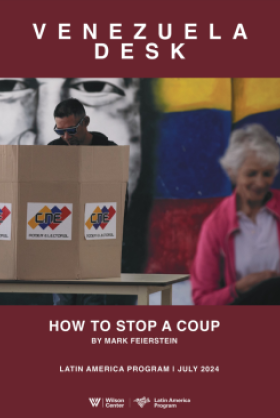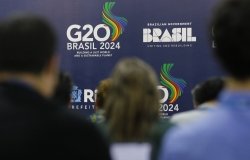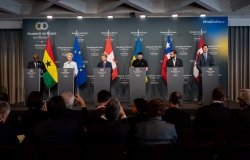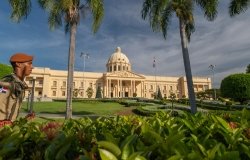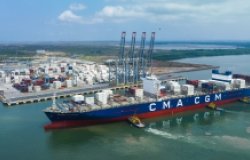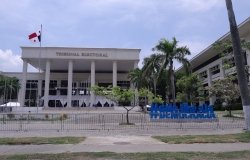Energy and Development in South America
The goal of the seminar is to analyze the ways in which energy serves as a cause of conflict or of cooperation in South America, with a particular focus on how energy resources are used both as an instrument to promote national development and as a factor in regional politics.
Overview
On November 28, 2007, the Latin American Program and the Facultad Latinoamericana de Ciencias Sociales in Santiago (FLACSO-Chile) convened a group of experts on energy to discuss the role of energy resources as an instrument of cooperation or conflict in South America. Cynthia Arnson, Latin American Program, noted the high levels of interdependence among Latin American countries with respect to fulfilling their energy needs. Arnson also highlighted the resurgence of resource nationalism in South America, where left-leaning, populist leaders are seeking to take advantage of high commodity and oil prices to extract a greater share of resource rents.
Francisco Rojas, FLACSO, emphasized that energy is potentially a force for integration and economic growth, but also can serve as the basis for revived historical and geopolitical grievances in the region. He decried the low levels of nergy cooperation in the hemisphere, despite the existence of a number of bilateral agreements and projects. Meeting the region's long-term demand for energy and enhancing its insertion in the global economy will require massive investment, he said. Thus far, however, the region lacks an overarching vision for energy integration that would balance the needs of both producers and consumers. Rojas called for an academic, hemispheric debate on the peaceful use of nuclear energy, saying that it holds potential for meeting global energy needs and would contribute less to global warming and pollution than hydrocarbon-based fuels.
Secretary-General of the Organization of American States José Miguel Insulza stated that the abundance of resources in Canada, the United States, and Latin America makes energy a truly hemispheric issue. He noted estimates by he Inter-American Development Bank that regional energy needs would increase by 75 percent over the next 25 years, and that providing reliable and affordable energy to meet that demand was a key challenge. Despite its status as a net exporter of energy (the region accounts for 13.8 percent of world oil production but only 8.1 percent of consumption), governments face high pressure to deliver energy to the poorest sectors of their own societies. Price volatility affects producers and consumers of energy in different ways, he said, and that imbalance was a source of instability. Latin American countries must move to integrate in order to compete in world markets, he said, noting that many leaders talk about integration at the same time that they talk about self-sufficiency. Calling those two impulses contradictory, Insulza called for the diversification of energy sources as well as the increased efficiency of both production and consumption.
"Energy is not useful if it is not associated with the services it provides," according to Brazilian analyst Sergio Trindade of SE2T International. Development and energy are intrinsically linked through services and through the role of energy as a factor of production. While this link encourages the politicization of energy because it is seen as a form of political power, it also allows countries to use their energy infrastructure to increase human capital. Trindade cited Brazil as an example for which the growth of research and knowledge has paralleled the growth of the various industries (including electricity, deep-water drilling, and ethanol), with the result that Brazil took a leading role in energy production. However, he cautioned that 20 million Brazilians are still "off the grid," and as such, governments must continue to prioritize energy development regardless of the political views of a particular administration.
RoseAnne Franco, PFC Energy, outlined the "energy vision" of Venezuela within the context of the country's position as a regional leader in oil and natural gas reserves. She noted that Venezuela has historically felt an obligation towards its neighbors, and prioritizes social and industrial development both at home and abroad. This has led to assertions of national sovereignty over the domestic energy industry as well as calls for integration with other countries in the region. According to Franco, Venezuela's regional integration plan relies on the Orinoco oil belt: if these heavy and extra heavy oil reserves can be fully developed, Venezuela would become the top energy resource holder in the world. Development of the Orinoco belt has provided the Chávez government with the opportunity to forge relationships with national oil companies (NOCs) from the region and around the world. However, it is unclear as to whether these state-run companies have the funding and technical expertise to successfully operate in Venezuela and help spur regional integration. Venezuela's policy of giving priority to national oil companies is best exemplified by the role its own NOC lays in domestic social development. Between 2003 and 2006, PDVSA's spending on social programs went from $240 million to $13.36 billion. This has led many experts to fear that social programs are coming at the expense of new exploration nd production in Venezuela. Given these conditions and others, Franco questioned whether Venezuela's regional integration and social development goals can go hand-in-hand.
David Mares, University of California-San Diego, echoed the claim that access to energy is vital to development, noting that this access ranges from 95 percent electrification in Argentina to 36 percent in Haiti. Mares highlighted this disparity as a key factor that could be addressed through regional integration. One of the great challenges to integration, however, is maintaining the ntegrity of institutions in countries where governments are predisposed to corrupt, rent-seeking behavior. Mares pointed to conflicts over the natural gas pipeline between Argentina and Bolivia, the failure of Hugo Chávez' Gran Gasoducto del Sur, and Petrobras' investment freeze in Bolivia as evidence that energy integration is on the decline in South America. Energy-producing countries must examine how best to capitalize on investment, fairly distribute economic rents, find a balance between domestic and export market supply, establish regulatory regimes to mitigate uncertainty, and be cognizant of the economic risks of using nergy as a foreign policy tool. According to Mares, this begs the question, "will integration in the region be driven by political agreements or market relationships?"
Thomas O'Keefe of the Mercosur Consulting Group labeled the Argentine government's intervention in the energy market as a response to political pressures emanating from the political and economic crisis of 2001–02. Former President Néstor Kirchner intervened in the energy sector market—converting end-user rates for natural gas into pesos and freezing prices—despite the inevitable "bottlenecks" that these measures would create in the future. Artificially low prices removed an incentive for private sector firms to invest and meant that consumers had no incentive to conserve their use of energy. According to O'Keefe, the Kirchner government apparently preferred to subsidize the importation of alternative fuels and natural gas (from Bolivia) in times of shortage instead of allowing the market to correct domestic prices. This was further complicated by arbitration cases brought against the Argentine government by private sector actors. As a result of Kirchner's actions and current shortages, current President Cristina Fernández de Kirchner may face heightened pressure to restore market mechanisms for domestic users of natural gas and electricity.
Bolivia's history has been full of natural resource based conflicts, according to Humberto Vacaflor, Siglo 21. Under a plan developed by the government of former President Gonzalo Sánchez de Lozada, Bolivian natural gas was to be exported through a pipeline running across Chile to the Pacific Ocean. Chile would benefit not only from the natural gas it would liquefy, but also from resulting investments in the LNG sector. The public opposition o this plan was tremendous. Protestors took to the streets in demonstrations that contributed to the ouster of Sánchez de Losada. The memory of this conflict currently impedes any type of bilateral energy cooperation with Chile. Oil in Bolivia also has a conflictive past, Vacaflor said. The first oil company to operate in the country was Standard Oil; its corruption and unwillingness to sell oil to Bolivian military planes during the 1930s Chaco War between Bolivia and Paraguay provoked the first nationalization of the country's oil industry and the creation of a state-owned oil company, Yacimientos Petrolíferos Fiscales Bolivianos (YPFB). However, YPFB was later privatized under ánchez de Lozada, and Bolivia is now experiencing the consequences of the failed privatization ffort. According to Vacaflor, the current government is unable to find a balance between attracting the investment needed to develop and produce natural gas while simultaneously extracting a portion of the royalties to address issues of inequality in Bolivia.
Oscar Landerretche, Universidad Técnica Federico Santa María, asserted that import-dependent Chile has struggled to develop efficient regulatory frameworks. He suggested that regional energy integration—with a harmonized regulatory and normative framework—would allow for the correction of these inefficiencies by allowing competition and investment. Chile demands a large amount of energy because of its extensive mining sector. Since it relies on commodity markets for these energy imports, Chile requires stable rules of the game in the international trading system. In order to move forward with integration then, Chile should promote "open regionalism," which would maintain market-oriented and nonprotectionist policies. According to Landarretche, current surges in populism and "exacerbated nationalism" in the region represent a backlash against ill-conceived, market-oriented policies. However, Chile must not over-react to energy shortages or crises by imposing costly measures such as energy rationing. Chile's long-term interests lie in the diversification of its energy sources, he concluded.
Documents & Downloads
- Energy and Development in South AmericaDownload
- Energy and Development in South AmericaDownload
- Energy and Development in South AmericaDownload
- Energy and Development in South AmericaDownload
- Energy and Development in South AmericaDownload
- Energy and Development in South AmericaDownload
- Energy and Development in South AmericaDownload
- Energy and Development in South AmericaDownload
Hosted By

Latin America Program
The Wilson Center’s prestigious Latin America Program provides non-partisan expertise to a broad community of decision makers in the United States and Latin America on critical policy issues facing the Hemisphere. The Program provides insightful and actionable research for policymakers, private sector leaders, journalists, and public intellectuals in the United States and Latin America. To bridge the gap between scholarship and policy action, it fosters new inquiry, sponsors high-level public and private meetings among multiple stakeholders, and explores policy options to improve outcomes for citizens throughout the Americas. Drawing on the Wilson Center’s strength as the nation’s key non-partisan policy forum, the Program serves as a trusted source of analysis and a vital point of contact between the worlds of scholarship and action. Read more
Thank you for your interest in this event. Please send any feedback or questions to our Events staff.
